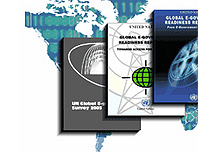 Following Russia ICT Day, organized by the World Bank in cooperation with Russia in Washington DC, a delegation of 42 high-level officials from the Russian Federation visited UN DESA’s Division for Public Administration and Development Management (DPADM) on 15 November, for a presentation on the United Nations e-Government Development Index (EGDI).
Following Russia ICT Day, organized by the World Bank in cooperation with Russia in Washington DC, a delegation of 42 high-level officials from the Russian Federation visited UN DESA’s Division for Public Administration and Development Management (DPADM) on 15 November, for a presentation on the United Nations e-Government Development Index (EGDI).
The Russian Federation has made significant progress in e-government development since 2010, both in absolute terms and relative to other countries, with a notable jump in its global ranking between 2010 (59th place) and 2012 (27th place). The gain can be attributed to: (a) a doubling in availability of government e-services; and (b) an increase in the number of Internet users (from 21% to 43% of the population) and fixed broadband subscriptions (from 3% to 11% of the population).
According to the World Bank, Russia has 76 million Internet users and an e-commerce turnover of $13 billion a year. The country’s e-government performance has reached the EU average, despite the challenges of a large population and vast geography. Its ICT industry boasts world-leading brands in the IT sector, fuelled by over 60,000 graduates in Science, Engineering and Mathematics each year.
To some extent, Russia has struggled with e-government development. The “Electronic Russia” programme (2002-2012) was an ambitious 9-year effort deemed by some observers to have been unsuccessful. Currently, Russia is pursuing an “Information Society State Programme” (2011-2020) with the aim of providing Russians with enhanced access to broadband Internet, developing the ICT sector, promoting Internet safety, and simplifying interaction between citizens and the State through e-government.
DPADM gave several presentations on the 2014 e-Government Survey, Capacity Development, Open Government Data, Public Service Awards and Forum, and Innovation Transfer followed by Q& As on the ways to improve e-Government performance on federal and local levels in the country and bring the benefits of the information society to all citizens.
Within the margins of the visit, Thomas Gass, DESA’s Assistant Secretary-General for Policy Coordination and Inter-Agency Affairs, met with the Minister of Communications and Mass Media of the Russian Federation, Mr. Nikolai Nikiforov, Permanent Representative of the Russian Federation to the United Nations, Mr. Vitaly Churkin and other high level officials and DPADM staff members.
Discussions were held on the future cooperation of UN DESA and Russian Government in the field of ICT and its use to enhance service delivery for public administration. It was agreed that Russian Government will invite DPADM Advisors to assess e-Government performance and provide guidance and recommendations on how the Government can overall improve public service delivery, bridge the digital divide, implement whole-of-government approach, greater use of social media and open government.
For more information: Website of DPADM
